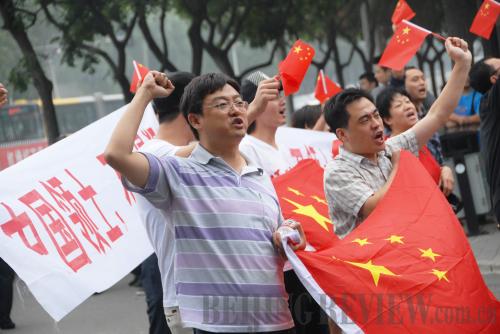|
 |
|
PUBLIC OUTRAGE: Chinese protesters demonstrate against the Japanese Government's "purchase" of three islets in the Diaoyu Islands outside the Japanese Embassy in Beijing on September 12 (WEI YAO) |
"Even Buddha can have a temper," says an old Chinese proverb. Now, China is enraged by the Japanese Government's offensive stance on the Diaoyu Islands.
Ignoring China's protests, Japan's Yoshihiko Noda administration insisted on "purchasing" some of the islands from their "owner" in September, provoking China to take a series of countermeasures. Observers pointed out that China will not compromise, citing concerns over national dignity and territorial integrity. There have been calls for more political, economic and diplomatic measures by China to deal with the situation, as well as warnings that Japan must accept the consequences of its provocative acts.
Damaged relations
The Diaoyu Islands are China's territory and China has a legal right to counter Japan's attempts to seize the islands, said Chinese observers. They warned Japan would start more regional conflicts on territorial disputes if China does not make a strong response. Japan's position on the Diaoyu Islands is tantamount to a denial of the outcomes of victory in World War II and poses a challenge to the post-war international order.
The Japanese Government signed a contract with the Kurihara family, claimed by the Japanese side as the "private owner" of the Diaoyu Islands, on September 11. The "purchase" cost the Japanese Government some 2.05 billion yen ($26.15 million). Two days earlier, Chinese President Hu Jintao had face-to-face talks with Japanese Prime Minister Yoshihiko Noda on the sidelines of the annual meeting of the Asia-Pacific Economic Cooperation forum in Russia's Vladivostok. Hu iterated that any method by which Japan tries to "purchase" the islands would be illegal and invalid. China firmly opposes such moves, warning that the "purchase" would hurt relations between the two. On September 10, Chinese Premier Wen Jiabao also declared the Diaoyu Islands are an inalienable part of China's territory and that China will "absolutely make no concession" on issues concerning its sovereignty and territorial integrity.
China took a series of countermeasures after Japan's "buying" of the islands. Demonstrating China's sovereignty over the islands, Chinese marine surveillance ships reached the waters around the islets. The Chinese Government announced the base points and baselines of the territorial waters of the Diaoyu Islands, which is in accordance with China's law on territorial seas and adjacent zones adopted in 1992.
"The Diaoyu Islands and their affiliated islands have been China's inherent territory since ancient times. It is within China's legal rights to announce the boundaries of the territorial waters," said Qu Xing, President of the China Institute of International Studies (CIIS). Previously, China and Japan had formed a mutual understanding to set aside disputes and maintain the present status quo, which was the reason why China didn't make the declaration earlier, Qu explained. "China will never be the first to instigate a dispute," he said. "But Japan chose to issue this challenge, and China will not be daunted by it."
The Diaoyu Islands, in the East China Sea between China and Japan, have belonged to China since ancient times. For centuries, fishermen from China's Taiwan, Fujian and other provinces conducted activities such as fishing and collecting herbs in the area. The islands appeared on China's map as early as the Ming Dynasty (1368-1644). There are records about the islands in a book published during the rule of Emperor Yongle (1403-24), more than 400 years before Japan claimed discovery of the Diaoyu Islands in 1884.
Xing Guangmei, a researcher with the Chinese Naval Research Institute, said announcing the boundaries of the territorial waters is a precondition of confirming water areas under China's jurisdiction. According to Chinese law, unauthorized foreign vessels, except for civilian ships for innocent passage, should not enter China's territorial waters, or it can be considered an invasion of China's territory. And China has legal rights to take any action against invasion. The dispute over the islands has now officially upgraded to the practical confrontation phase, Xing said.
"The Sino-Japanese relationship is at a crossroad of history," said Ruan Zongze, Vice President of the CIIS. Disputing the islands could be a long-term contest of the two countries' willpower, which cannot be settled within a short time. However, Ruan warned, if China doesn't crush Japan's aggressive ambition on territorial disputes, the whole of East Asia will suffer consequences.
"Japan made misjudgments on the Diaoyu Islands issue," Ruan stressed. Its first misjudgment was that it underestimated China's determination to protect its sovereignty and territorial integrity. China is no longer the country it was 100 years ago, when it lacked the ability to fight against foreign invasion, he said. Although China sticks to the principle of peaceful development, it will never sacrifice sovereignty and territorial integrity.
Japan tried to draw the United States into the Diaoyu Islands issue because of their alliance. But Washington will not be led into conflict just for Tokyo's interests, Ruan stressed.
| 